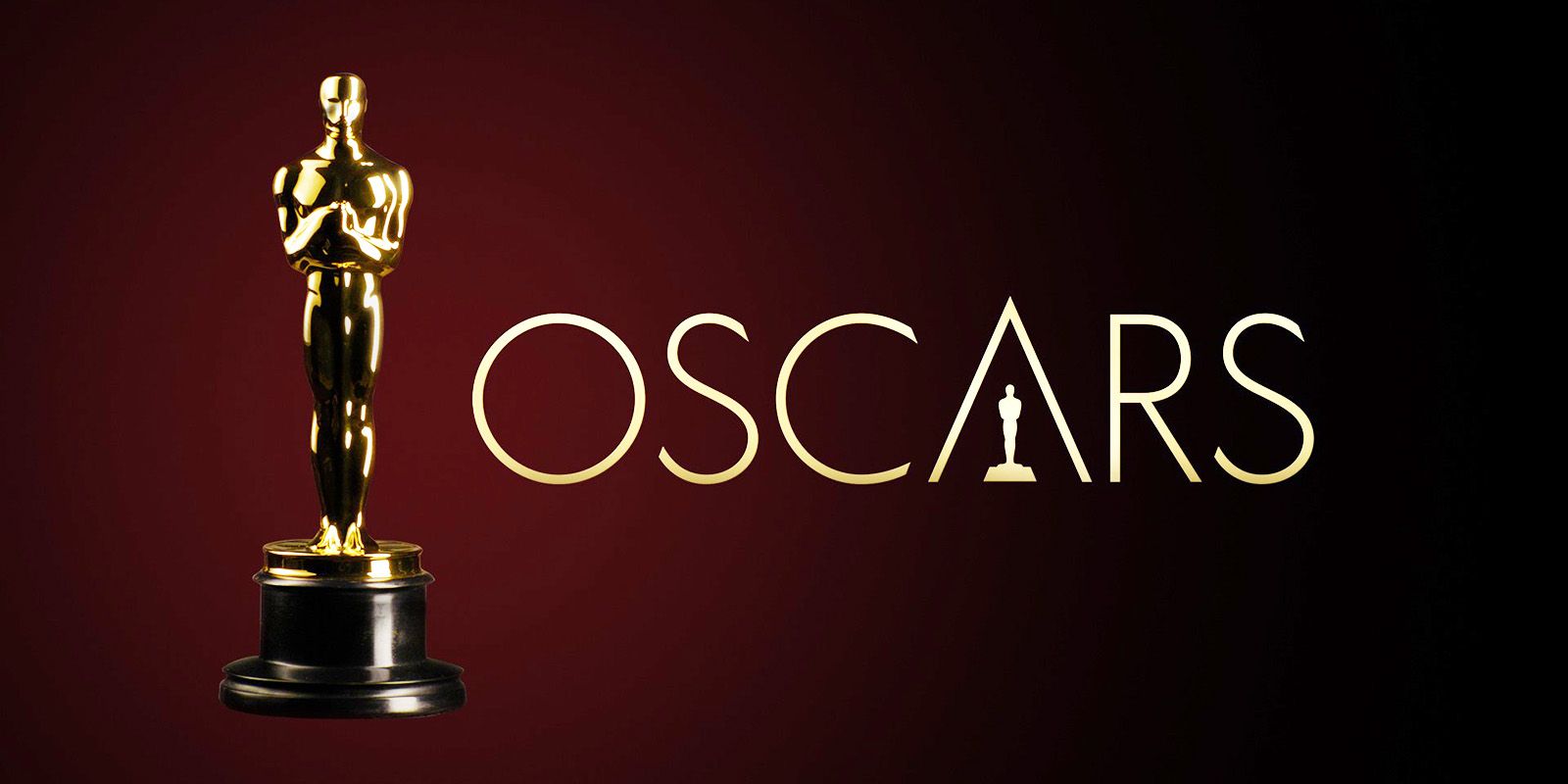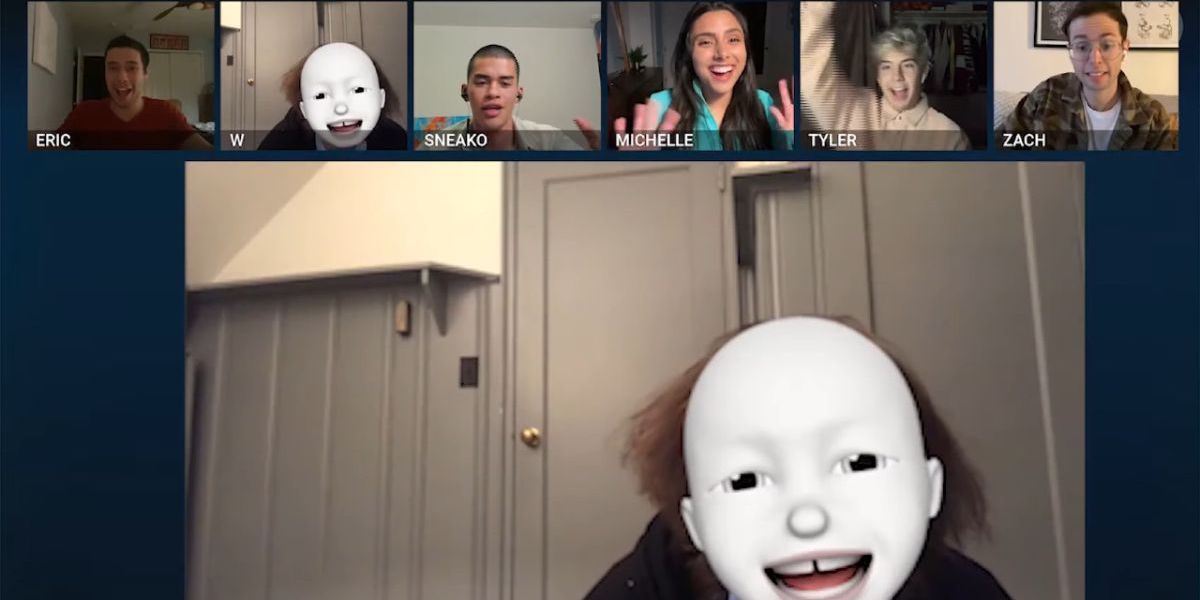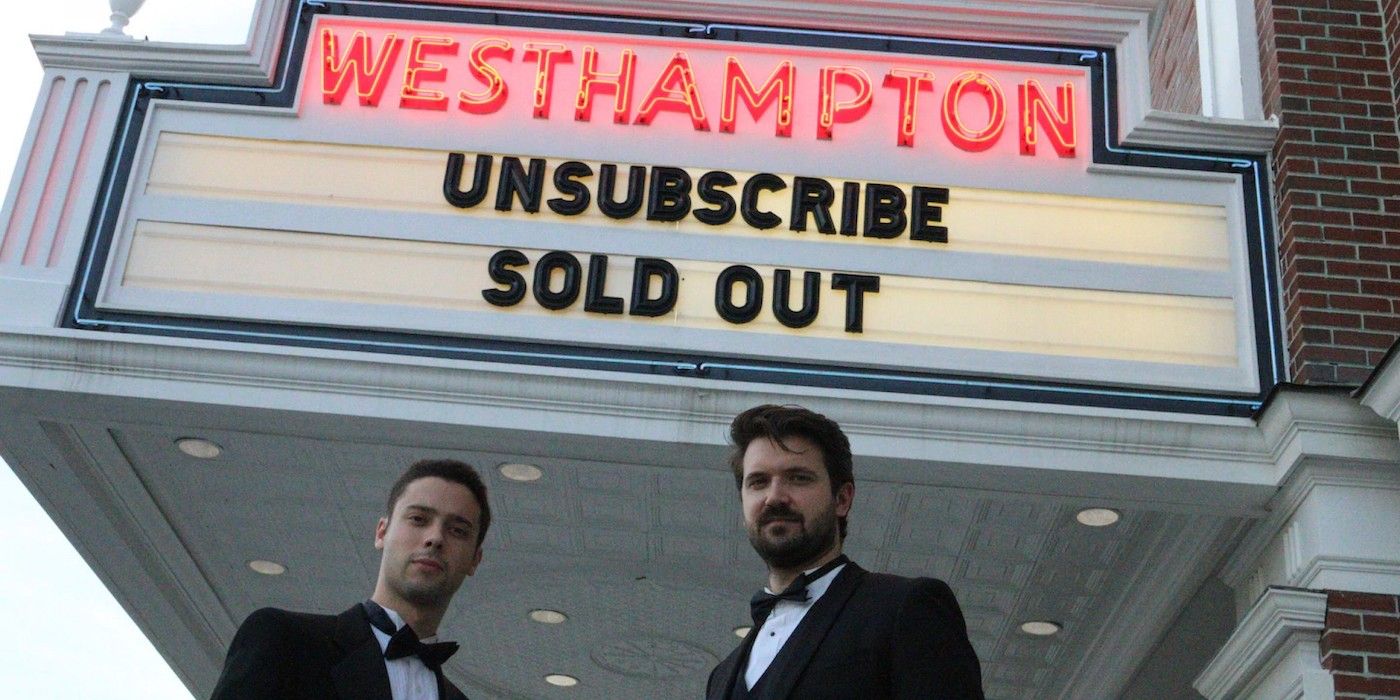Unsubscribe Short Film: Christian Nilsson & Eric Tabach Interview [EXCLUSIVE]
The American box office was completely decimated by the 2020 Coronavirus pandemic, to the point where many would-be blockbuster releases have been pushed to 2021, or even foregoing theaters entirely, opting to release on streaming services instead. On June 10, an anomaly occurred when Unsubscribe, a 29-minute short film produced on an official budget of zero dollars, became the #1 movie in America for a single day. Most industry analysts had the same question: "what the heck is Unsubscribe?"
Unsubscribe is the brain child of Christian Nilsson and Eric Tabach, a pair of former BuzzFeed employees who saw an opportunity and seized it. After the Covid pandemic caused Nilsson to lose funding for his debut feature, Westhampton, he and Tabach decided to use what little resources they had and create a movie anyway. Then, they used a distribution technique called "Four Walling," where the filmmakers rent a movie house for a flat fee and keep any ticket sales for themselves. After renting a local theater, they bought every single ticket, spending over $25,000 in total, enough to make Unsubscribe the #1 film in America, and earning significant media attention for both Nilsson and Tabach, two filmmakers who didn't let a lack of funding stop them from taking a chance, making some art, and doing what others said couldn't be done.
Not content to rest on the memetic success of Unsubscribe, Nilsson and Tabach are seeing how far they can take this thing, and the next chapter of their odyssey finds them on a quest to take their little horror short all the way to The Oscars. Time will tell if their ambition will shake out to genuine awards season success, but Nilsson and Tabach have their eyes on the prize, and it's worked well enough for them so far.
While promoting the prospective future of Unsubscribe, Nilsson and Tabach spoke to Screen Rant about their work on the film, as well as their unprecedented road to success, and their Oscar ambitions. They also discuss their upcoming feature film, which was given funding and a green light following the success of Unsubscribe. Above is the latest YouTube video from Tabach, describing their current plan to possibly win an Oscar for their work on Unsubscribe.

Screen Rant I am an enthusiast of Box Office Mojo. In the old days, I used to look at it every single day to get my daily dose of movie math. I kind of stopped during the pandemic because the numbers just dropped off to near-zero. But then one day, I saw Unsubscribe at #1 and was like, "What the heck is that and how did it get to #1?
Christian Nilsson: I'm the same way, I look at those numbers all the time. And trying to figure out what movie theaters were still open! One of the reasons this project came about so quickly was because we were already so aware of the landscape and how to make it work, what type of theater to go into, the day it would need to play, all that. We came in with a pretty firm idea of it all.
Before the pandemic, what was the last movie you saw in theaters?
Christian: The last movie I saw was at Nitehawk in Brooklyn. I saw Portrait of a Lady on Fire, which was incredible. As far as a last movie to see before going into lockdown, that was definitely a really good one. I kind of nerd out. I keep track of every movie I see every year. I generally see between 50 to 60 new movies every year, most of which I'll see in a theater. But this year, I think I've seen a total of ten movies from 2020. And I only saw one in theaters, and Lady on Fire came out last year, so... It's been depressing for any sort of cinephile. Movie theaters have always been my safe space, and I'm introverted, so it's my favorite experience, and I've definitely been feeling the lack of that this year.
So, for anyone who doesn't know, fill us in. How did you make the #1 movie in America?
Eric Tabach: It feels like it's been seven hundred years, but at the start of the pandemic, I was so bored and lost. I had nothing to do because everything was put on hold. My dream was to act. I was auditioning and performing. When everything was put on hold, I had nothing! I would check on what movies were coming out and what was going on with Hollywood, and I noticed that box office numbers were crazy low. I immediately started thinking, there's something there. There's a stunt there, there's a way for us to take advantage of that. (Laughs) To propel our careers. I immediately called Christian because I knew he was just as passionate about making movies as I was about being in movies. I reached out to him, and the moment we spoke, we knew there was an idea here. Christian started researching and then he found out about the concept of "Four Walling," which is a way smaller movies make money. We realized we could make more money than any film was making at that point in time. So we just went for it right away.
Christian: We also realized, in that moment, we could make anything. We could have literally filmed ourselves jumping up and down and that could have been the #1 movie in America. But we thought it was an opportunity to propel our own careers. So I pitched to Eric, let's make an original movie that's just as borne from this moment as this whole opportunity is. Let's make a horror movie over Zoom! I was inspired by Rear Window. What if you saw a murder or something happen in a Zoom frame? How would you react? What power can you have? How can we do that? Literally, the next day, I wrote the script. The next day, Eric cast it. Over the next four days, we shot the entire thing over Zoom. It was less than a month from when Eric called me to the day we premiered the film.
I'm not a filmmaker. But I know people who made $200 million movies, and they go, "Ah, if only I had $250 million!" Or $100 million, or $30 million, or $1 million. And I have friends who are filmmakers who go, "Oh, I can't do this because I don't have $30,000." But then I know people, and there are people like you, who make their movies, no matter what. You made this movie on an official budget of zero dollars. Those are the things that inspire me more than anything else. Tell me about making a movie with a zero dollar budget.
Christian: I was in an interesting place when Eric called me. I had been working on a movie, a feature film, for the last five years. That movie started with a budget of $250,000, and then it became a $1.3 million movie, and then it became a $2 million movie, and then Covid happened and I lost all of it.
The funding was pulled.
Christian: You have those... To me, they're excuses, of, like, I can't do this because I don't have money. But then, there was a mindshift that happened when Eric called me, where I went, okay, what do we have access to? We don't have access to cameras. I'm not a cinematographer. But a webcam always looks like a webcam. If we shoot it over Zoom, it will inherently look like the real thing. And then we figured out these cinematography tricks we can do. Like, if you lean away from a camera in a dark room and then lean forward really quick, you can get a jump scare out of that. And it kind of took the excuse away from us. That's how we made a movie for zero dollars. We took stock of the things we had at our disposal, the talent we had, and I literally wrote a script to those points. The day before I wrote the script, Eric sent me a list of people, actors, YouTubers he knew. And I wrote a movie for those people based on their time availability. So Zach from The Try Guys, he said, "I can give you fifteen minutes on one day." So I was like, okay, if he's the birthday boy, he can be in it for five minutes. He can literally just join the Zoom meeting and then leave the call right away. It was written for what we had available to us, and that's how we were able to make it for zero dollars.

Truly inspiring. There's the whole story of the behind-the-scenes and #1 at the box office, that's the lede, but I think what will stand the test of time is that you made a movie, a real movie, a half-hour cyber horror that people like... And that you think might be able to win some awards!
Christian: That was always the aim. One of the things I think was most flattering to Eric and I when we were getting the initial response was... I forget the ad news company, but it was an advertising news outlet, and they were calling out the genius of the stunt, not for what we had done, for the box office stunt itself, but for what we had done for our careers, and how we were taking ourselves from obscurity and putting ourselves on the map a little bit. We can't talk about this too much, but it did lead to us being able to make a feature film during Covid. It was definitely a thought-out plan that worked, in more ways than one.
Eric: It's insane, too, to just see the response from, like, traditional mainstream media people. I know my buddy, one of my best friends, is in a relationship with Kevin Smith's daughter, and he texted me and was, like, "Bro, I was at dinner, and Kevin Smith was, like, did you hear about these two crazy guys who made the #1 box office movie? They're genius!" And I was like, that's crazy, that people were respecting what it was. It wasn't just a silly stunt. People really connected with what we did.
Christian: It happened in an interesting place during quarantine. It was a few months into everyone being on lockdown. I think people were looking for a story about somebody "winning," and making it work. There was no victim in what we did! We did it on a Wednesday because we didn't want to take a coveted weekend spot from somebody. And I think people gravitated towards it because they were looking for some good news during really tough times.
It's nice to hear an entrepreneurial story where nobody actually gets hurt. Nobody loses here. Nobody here made their success by causing someone else to fail.
Christian: Yeah! (Laughs)
Eric: Somebody used the term, "profiteering," but nobody profited! We really didn't make any money from this!
Yeah, and you had to pay taxes on the money you took in, which you had spent yourself, right?
Eric: Which I did not realize! I was not informed of that. (Laughs)
The feature film that you're working on, that you can't talk too much about, that's separate from the movie you had almost made before, Westhampton, right?
Christian: It's not Westhampton, no. What I can say, though, is we were initially approached to make a feature film version of Unsubscribe. And I said to the person who reached out, "I can do you one better." So I pitched a completely original idea that was built on the success and visuals of Unsubscribe, but it's completely different.
I'm interested in Westhampton, too, because I'm in Far Rockaway, in a little beach bungalow. I'm basically just across the water.
Christian: Yes, it's a similar vibe.

Okay, let's jump into awards season. What's your plan for The Oscars?
Eric: When the stunt was done... First of all, we didn't immediately get a response. But after around three days of waiting, all of a sudden, the story blows up and we start getting all these interviews. And everyone keeps mentioning, "They should apply for an Oscar," just as a joke, casually. It's just the logical next step of how to infiltrate Hollywood, basically. Everybody was saying it as a joke, and we were like, "Can it be that complicated?" So Christian started doing an insane amount of research, and learned there were a specific set of steps we could take to actually qualify for an Oscar. We had a chance to get our "#1 summer box office hit movie" considered for an Oscar nomination. Basically, we decided to take everybody's joke and make it reality.
Christian: We did a segment for CBS This Morning, and the person who was interviewing us joked, "We'll talk again when you guys are nominated for an Oscar!" And it was another lightbulb moment, similar to when Eric called me, just a month prior to that. I was like, "Wait, we might have a similar opportunity to take advantage of this landscape." Traditionally, there's two ways for a short film to qualify for an Oscar. It can either win an Oscar qualifying film festival, or it has to complete a seven day consecutive run in either Los Angeles or New York City. When the idea was first pitched to us, I knew there were no film festivals that were taking place, and very few Oscar qualifying ones actually happened before the market really closed. So I saw nobody was going to really qualify that way. And movie theaters in New York and L.A. had been closed pretty much the entire year. So what films were being nominated? What does that competition even look like? So they updated the rules in the early Spring to include other cities. They included Miami, Atlanta, and Chicago. I called every single theater in those cities, to see if they would let us screen our film for seven consecutive days. Most of the theaters were either not operating, or they didn't want to put a small film in one of their theaters to lose any potential profits they could make. We were lucky to get one theater in Chicago to agree to it.
You got one!
Christian: Eric and I were literally on our way to Chicago when we got alerted that the theater had to shut down again. So we were now on our way to Chicago and there was no ability to show our film there. What complicated it even more was that we only had a 60 day window from when it first premiered that we could qualify. So we were on day, like, 51 or 52. We needed something then and there to be able to qualify. When we were in Chicago, we just called every theater we could, and we got the Music Box Theater in Chicago, a beautiful theater, they agreed to let us do a seven day consecutive run there.

What a set of hoops to jump through! It's such a weird club. It's like a ritual you have to do to get there. I can see people who wear monocles being, like, "They don't belong here!"
Christian: We can be disqualified for any reason. They could just not like that we've done this and disqualify us. They don't need a reason to take us away!
Eric: It's fascinating. Obviously, as an actor, my grandpa's biggest dream is to live to see a day where I can win an Oscar. That's what everyone always talks about. Oscars. Everyone's goal is to get one. It's been fascinating for me to learn just how complex the whole process is. It's not just a board who goes, "We're gonna nominate these people," and, "Oh, this guy's the best, he wins." There are processes and campaigns and money being invested. It's a game. It's way more complex than I had imagined. Doing this little stunt has already opened my eyes to how intricate the entire nomination and winning process is. Most people who aren't in this field don't know.
Christian: There's such a high barrier to entry. Because of the pandemic, that barrier has been lowered a little bit, and we've been able to take advantage a little bit. Unsubscribe would never be nominated or make a shortlist for The Oscars, but from what we've been told, it has a shot in 2020.
Eric: We're trying to discover what barriers have been lowered because of the pandemic, and placing ourselves into them, to experience it and see what it leads to!
Christian: If we qualify and make the shortlist, we're doing a full-on "For Your Consideration" campaign! That will probably be the next piece.
I hope you do, because it feels like a movie for and about and made by the little guys, at least while you guys are still little. I think it's inspiring, that you went, "The Oscars are an exclusive club, they don't let people like us in there, but we're here, so what are you gonna do about it?"
Christian: Yeah, it's exciting.
I know you've got your movie lined up that you're working on, and we'll see if you can revisit Westhampton at some point, but what are your goals and ambitions for the upcoming era of 2021/2022?
Christian: The release of the movie is exciting, this next one. I can say that we're pretty far along in post-production at the moment. For me, personally, since I lost funding for Westhampton at the start of Covid, it's all been about... How do I put these pieces back together where I don't have to rely on other people? How do I take back control? For Eric, I feel like it was a similar experience with what he was going through. How do we take control in a real societal moment where nobody has it? What do we have the power to do in the moment?
Eric: My whole life, and I think Christian is similar, my whole life has led to this. I've constantly been trying to figure out how to take control. This creative field is so complicated, and you're always waiting for somebody else to give you an opportunity, waiting for somebody to notice you. For a long time, I've been trying to figure out how to take control of that. Even the way Christian and I met is because of that. I was close to doing a very big film, but I didn't get it and I was frustrated. So I decided to start creating my own content, which is why I even applied to work at BuzzFeed, because I wanted to learn to produce and develop my own things, and that's where we met, and that's what we bonded over. How can we make our own thing? How can we just start creating and not have to wait for producers to give us an opportunity, to notice us? A 2021 goal for me would be to get some buzz around something we did that's not really a stunt. Just buzz around something we did so well that everyone is talking about it or watching it. I think that would be pretty freaking cool!
Christian: To have people actually sitting in the theater!

This may have started out as a joke or a lark or stunt or a prank, or whatever they want to call it, but who's laughing now? You set out to do something, and you did it. You're doing it. At this point, if people want to see it as a goof, that's on them.
Eric: Very rarely in my life have I said, or have people said, they're going to do something, and then actually follow that trajectory and the plan. How long has it been, seven months?
Christian: It's almost seven months to the day since you called me.
Eric: It's been seven months since we had this idea, and we actually had a plan. Christian actually wrote out a plan.
Christian: It was a seven part plan. We're on step six.
Eric: And it's all been coming true, which is so insane. I think it's such a beautiful thing that very rarely happens. I think, especially in a creative field, I notice myself meeting up with people and going, "We're gonna write this, we're gonna create this," and it always falls through, or people get distracted when other opportunities come up, and it doesn't happen. But this one, we've been doing it for seven months, and it's been a really wild journey. And exhausting.
Unsubscribe is available to watch now on Vimeo.
from ScreenRant - Feed https://ift.tt/3g22cUb
via Whole story

Post a Comment